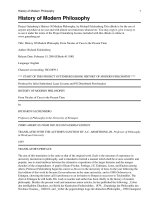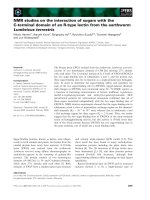Adverbials of time with the present perfect
Bạn đang xem bản rút gọn của tài liệu. Xem và tải ngay bản đầy đủ của tài liệu tại đây (87.91 KB, 2 trang )
Some Time Expressions with the Present Perfect
(Một số cụm từ chỉ thời gian của thì hiện tại hoàn thành)
1. HOW LONG
How long have you known Jack?
I am not really sure how long I have had this car.
2. FOR + a duration of time
My brother has been sick for 3 days.
I haven’t skied for ages.
3. SINCE + a point of time
My brother has been sick since Tuesday.
I haven’t skied since approximately 2005.
4. LATELY / RECENTLY
Have you read any interesting books lately / recently?
Lately / Recently, I haven’t read any good books.
Scientists have recently discovered a new breed of monkey.
5. JUST
I have just started my yoga class.
I’ve just heard your good news.
6. ALREADY
I’ve already heard the news.
We have already seen that film.
We have seen that film already.
7. YET (used in negative and interrogative sentences)
(YET chỉ được dùng trong câu phủ định và câu hỏi)
Has the train from Heathrow arrived yet?
I haven’t finished my assigned project yet.
8. ALWAYS
Normally, we use ALWAYS in the present perfect tense to show that something was true in the past,
and it is still true in the present.
(Thông thường, always được dùng với thì hiện tại hoàn thành để chỉ một sự việc nào đó tồn tại từ
trong quá khứ cho đến bây giờ vẫn còn)
I have always loved wild animals. (= I loved wild animals when I was young, and now I still love them)
I have always written with my right hand.
9. EVER (used in interrogative sentences)
(EVER dùng trong câu hỏi)
Have you ever been to any English-speaking countries?
Page 1 of 2
Have you ever visited our furniture showroom?
10. NEVER (used in affirmative sentences, but with negative meaning)
(NEVER được dùng trong câu khẳng định, nhưng mang nghĩa phủ định. Do đó, trong câu có NEVER
thì không bao giờ tồn tại từ phủ định NOT)
She has never been to any English-speaking countries.
I have never gone shopping alone.
11. BEFORE
Have you met him before?
I think I’ve seen that film before.
I haven’t been to Britain before.
12. SO FAR = UNTIL NOW = UP TO NOW (cho đến bây giờ)
So far / Until now / Up to now I have finished reading the first 5 chapters.
I have finished reading the first 5 chapters so far / until now / up to now.
13. ONCE / TWICE / MANY TIMES, ETC (to show the number of times that the action has happened up
to now – chỉ số lần xảy ra của một hành động nào đó)
I’ve been to Ireland once / twice.
We’ve been there many times / several times / a lot of times.
The terrorists have attacked the city five times.
14. DURING / FOR THE LAST / PAST + YEARS (to describe something that happened in the past and
still lasts up to now; however, the lime has been limited)
(dùng để miêu tả một sự việc nào đó đã xảy ra trong quá khứ, và vẫn còn kéo dài đến hiện tại; tuy
nhiên khoảng thời gian đã bị giới hạn lại)
Have you been to Mexico during the last/past 2 years? (the time is limited: 2 years)
Have you been to Mexico for the last/past 2 years?
There have been many wild fires during / for the last/past 10 years.
The number of wild animals has decreased gradually during / for the past/last 25 years.
Page 2 of 2









